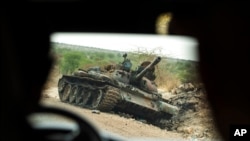Ethiopia has expelled a foreign correspondent working for The New York Times after earlier revoking his license over "unbalanced" reporting, a government official has confirmed.
The decision to kick out Simon Marks, an Irish journalist living in Ethiopia, drew swift condemnation from Reporters Without Borders, which said it was "the first time that a foreign journalist is expelled from the country" under Prime Minister Abiy Ahmed.
In a story on Marks' Friday expulsion, the Times said Ethiopian officials summoned him to a meeting Thursday and held him at the airport for eight hours before putting him on a flight early Friday.
"It is alarming that the government of Ethiopia treated the journalist, Simon Marks, like a criminal, expelling him from the country without even letting him go home to get a change of clothing or his passport," said Michael Slackman, the paper's assistant managing editor for international news, according to the Times.
Describing the experience on Twitter, Marks wrote: "Not only did Immigration officers prevent me from going home to collect my belongings but also from kissing goodbye to my beautiful 2-year-old son and two dogs, despite my polite requests. At least I could give my partner a kiss at the airport."
No license, no job
Mohammed Idris, head of the Ethiopian Media Authority, told AFP on Friday that Marks had no business staying in the country without a media license.
"You are here for a job. If you have the license, you will stay here. If you don't have the license, if we revoke the license, the responsible body will send you back," Mohammed said.
Marks has filed a series of hard-hitting reports on the war in Ethiopia's northern Tigray region. His accreditation was canceled shortly after he returned from a trip to Tigray in March.
Ethiopia's government has imposed tough restrictions on journalists covering the conflict.
A number of Ethiopian journalists and translators working for a range of international media organizations — including AFP, Reuters, the BBC and the Financial Times — have been detained while doing their jobs in recent months.
Journalists and human rights groups have nonetheless uncovered growing evidence of atrocities committed by armed groups in the region, including Ethiopian soldiers and Eritrean troops fighting on the government's behalf.
The revelations have contributed to growing international diplomatic pressure on Abiy, the 2019 Nobel Peace Prize laureate who will seek a new term in elections scheduled for June 21.
The government has said it is committed to investigating human rights abuses committed during its fight against troops loyal to the region's former ruling party, the Tigray People's Liberation Front.




